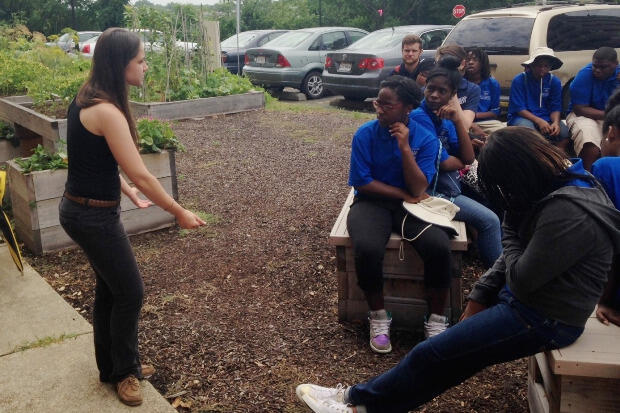
July 17, 2014
Local students' bright future ‘STEMs’ from sustainable present
Share this story
Last Thursday, the Richmond Mayor’s Youth Academy, in partnership with nonprofit organization Blue Sky Fund and Virginia Commonwealth University’s Office of Sustainability, toured three green attractions on the MCV campus, despite the light summer rain.
The field trip was part of Blue Sky Fund’s “Green Jobs, Blue Skies”summer enrichment program for urban youth focused on science, technology, engineering and mathematics (STEM) education. The program is designed to promote job readiness skills.
“We just wanted to encourage job readiness in middle school students and give them the opportunity to be exposed to a variety of employers in the area, especially ones that have STEM curriculum at their core, but then also are environmentally sustainable,” said Charles Johnson, program manager for Blue Sky Fund’s Richmond chapter in Church Hill.
Johnson said the visit allowed the program’s students to explore solar panels and alternative energy sources and to answer the question, “I always thought solar panels are cool, but what type of background do I need to get started in this field?”
The group of approximately 25 students first visited the solar panel array atop the N Deck parking deck, where, sheltered from the morning drizzle by the array overhead, they heard from Blue Crump, commercial sales manager for 3 Degrees, a San Francisco-based sustainability company that worked to install the $1.3 million array.
“Solar seems to be this strange technology that you don’t see a lot of, but it’s actually been around for quite a long time,” Crump said. “Right now the biggest challenge environmentally is looking for alternative ways to generate electricity. Currently, solar is one of the primary ways and wind is the other.”
Johnson said the kids had never seen a large solar panel array in person. He asked the kids what they thought might be VCU’s motivation behind pursuing alternative energy sources such as the ones they were seeing. Several students raised their hands with guesses.
“They pay a lot of money to power a lot of the buildings around.”
“It’s more long term. They’re trying to prepare for the possibility that energy will become more expensive or that fossil fuels will run out.”
“To save money for the future.”
Crump explained the three components to solar, which are the panels themselves, the inverter that switches the DC energy to AC power, and the meter the power feeds into.
He then pointed out all of the jobs needed in order to make the structure, such as steel workers, aluminum beam manufacturers, manufacturers of the panels themselves, electricians, designers, architects, facilities managers who coordinate the structure and how it impacts the users, and the electrical workers who install the panels.
When asked his background, Crump said he attended Virginia Tech to study architecture industrial design for his undergraduate degree.
The often unrelated areas of education and the careers they launched quickly became the theme of the field trip.
After Crump spoke, the group made its way to the front of the Jonah L. Larrick Student Center, where Carl Beckelheimer, energy engineer with VCU’s Facilities Management, explained a solar tracking array and elaborated on some of the other structural sustainability changes being made to both campuses. He also told them about how he started his career as a refrigeration mechanic on a service truck before going back to school to get his bachelor’s in business. He then started with VCU in the utilities department and worked his way up, joking that his passion for sustainable infrastructure was probably a result of him growing up in the 1970s.
VCU’s really a place to try things out. If colleges and universities didn’t try new things, didn’t test the status quo, then we’d never discover these new ideas and possibly new forms of alternative energy.
The final stop on the tour led the group to the community garden along the eastern outer wall of Larrick. Here, Parker Long, sustainability reporting and outreach coordinator with the Office of Sustainability, explained why green spaces are vital to urban campuses.
“Green roofs and community gardens help to connect students to the environment, to make the environment important to them, because it’s right there in their face,” Long said.
She then wrapped together the larger idea of why it’s important for VCU to lead the way on these sustainable efforts.
“VCU’s really a place to try things out,” she said. “If colleges and universities didn’t try new things, didn’t test the status quo, then we’d never discover these new ideas and possibly new forms of alternative energy.”
Subscribe for free to the weekly VCU News email newsletter at http://newsletter.news.vcu.
Subscribe to VCU News
Subscribe to VCU News at newsletter.vcu.edu and receive a selection of stories, videos, photos, news clips and event listings in your inbox.












